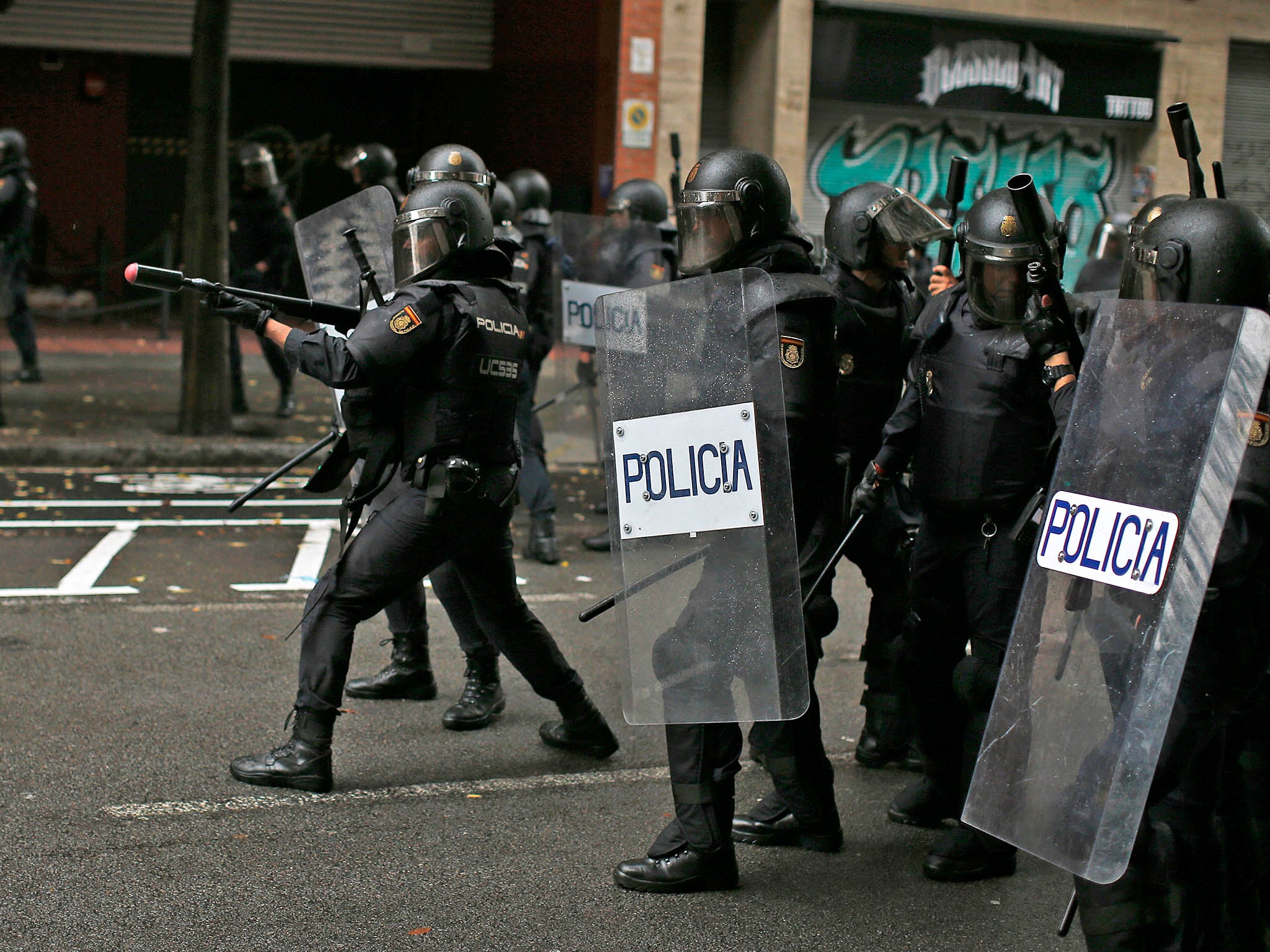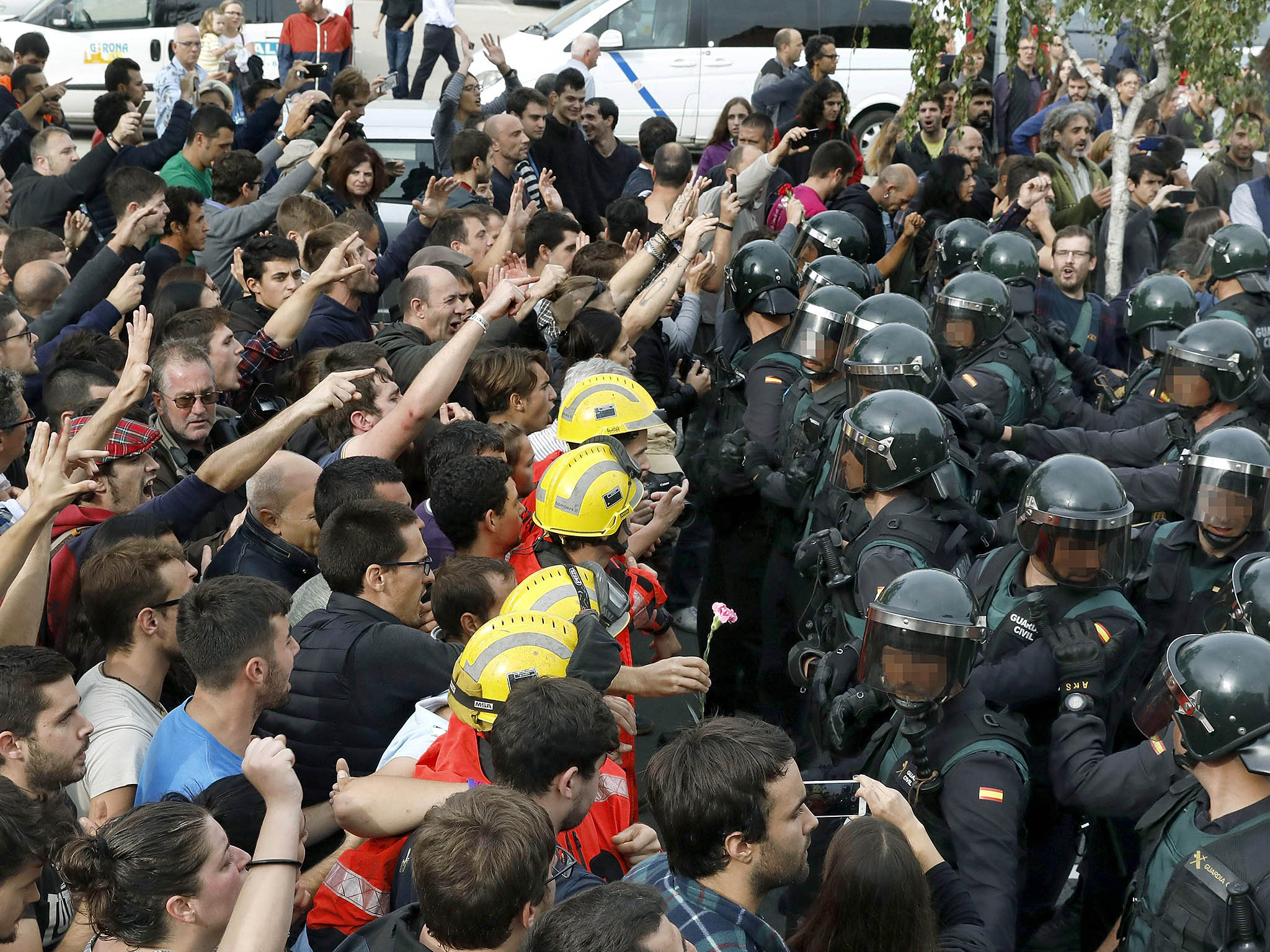Catalan referendum: Clashes with police leave nearly 900 injured, says Catalonia government
Local officials condemned 'brutal repression' of the vote, which was banned by Spain

Almost 900 people were injured in clashes during an independence referendum banned by the Spanish government, Catalan authorities have said.
The region’s department of health said four people remained in hospital, including two in a serious condition.
Most of those injured – more than 380 – were being treated in Barcelona, followed by Girona, Lleida, Terres de l'Ebre and other regions of Catalonia.
The figures were released after Catalan politicians condemned a police operation to shut down the referendum, which saw voters beaten with batons and dragged away from polling stations.
Riot police fired rubber bullets as they smashed their way into centres and confiscated ballot boxes in footage that sparked widespread condemnation.
Nicola Sturgeon said she was concerned by the images, adding: “Regardless of views on independence, we should all condemn the scenes being witnessed and call on Spain to change course before someone is seriously hurt.”
Jeremy Corbyn and the Liberal Democrat leader Vince Cable also condemend the "shocking" police response but there was silence from the Conservative Government.
The Belgian Prime Minister, Charles Michel, tweeted: ”Violence can never be the answer! We condemn all forms of violence and reaffirm our call for political dialogue.“
The UN had called on the Spanish authorities not to interfere “with the fundamental rights to freedom of expression, assembly, association, and public participation”.
“Regardless of the lawfulness of the referendum, the Spanish authorities have a responsibility to respect those rights that are essential to democratic societies,” a statement from the office of the High Commissioner for Human Rights warned.
“We urge all parties to exercise the utmost restraint and avoid violence of any kind.”
Catalan officials said 90 per cent of voters had chosen to leave Spain, but Madrid disregarded the result after declaring the referendum illegal and repeatedly vetoing independence.
Jordi Turull, the Catalan government’s spokesman, accused police of breaking agreements struck with the local security council but said the heavy-handed response had “encouraged us even more”.

“The State has tried to crack down on democracy,” he added. “It was like holding a referendum in the middle of a dictatorship.”
The Catalan President, Carles Puigdemont, hailed a “moment of great importance” for the region and praised the “courage and bravery” of voters.
He said the world was shocked by the “unjustified, abusive and severe police violence committed by the Spanish government”, noting that several world leaders had expressed concern over the “brutal repression”.
Addressing those injured in clashes with police, Mr Puigdemont added: “Some of you have suffered serious injuries, humiliation and clear human rights violations that cannot go unpunished.”
The leader accused Spanish authorities of an “absolute denial of reality…and evident hostility” towards Catalonia’s long-standing aspirations of independence.
Oriol Junqueras, the Catalan Vice President, said Catalonia had “won its right to be a new Republic, if this is what the Parliament decides”, with the local government counting more than 2 million “yes” votes and 176,500“no” out of 2.26 million counted ballots.
The referendum has no legal status after being blocked by the Madrid government and Constitutional Court for being at odds with the 1978 constitution, which states that Spain cannot be broken up, and there is little sign of support for Catalan independence in any other part of Spain.
But it has left Mariano Rajoy, the Spanish Prime Minister, facing the country’s biggest constitutional crisis in decades if Catalonia moves for secession.
Mr Rajoy offered to call all-party political talks to “reflect on the future” of Catalonia, but maintained his outright rejection of independence as an option
“I propose that all political parties with parliamentary representation meet and, together, reflect on the future we all face,” the Prime Minister said in a televised address.
He has the constitutional power to sack the regional government and put Catalonia under central control pending fresh elections.
Mr Puigdemont has called an emergency meeting of the Catalan regional government, while Mr Rajoy planned to coordinate next steps in a meeting with Pedro Sanchez, leader of the opposition Socialists.
The region is a centre of industry and tourism accounting for a fifth of Spain's economy, a production base for major multi-nationals from Volkswagen to Nestle, and home to Europe's fastest-growing sea port.
Although it already has extensive autonomy, its tax revenues are crucial to Spain's state budget.
That would raise tensions further in the region of 7.5 million people, a former principality with its own language and culture, and potentially hurt the resurgent Spanish economy.
Additional reporting by Reuters
Join our commenting forum
Join thought-provoking conversations, follow other Independent readers and see their replies
Comments